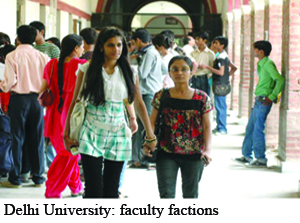Delhi: Four-year degree division
A new four-year baccalaureate (Hons.) degree programme, introduced by Delhi University from the new academic session beginning July, to replace the existing three-year BA/B.Sc (General/ Hons) course has sparked a major controversy in India’s most respected Central government-funded university (estb. 1922). This reform — the handiwork of the varsity’s high-profile vice chancellor Dinesh Singh — allegedly presented as a fait accompli without public debate, has split the DU faculty into two factions.
The left-wing Democratic Teachers’ Front, which controls the Delhi University Teachers’ Association (DUTA) has launched a vociferous ‘Save DU! Save Gen-erations of Students’ campaign. Led by Hindi Prof. Amar Deo Sharma, president of DUTA, it has chalked out a multi-pronged campaign to apprise students, parents, and intellectuals through signature collection drives, seminars and protest rallies about the negative aspects of the proposal. An online petition to the prime minister is also being promoted on the campaign website.
On the other hand, another group of teachers which includes DUTA secretary Prof. S.D. Siddiqui led by former DUTA president Aditya Narayan Mishra, supports the new American-style four-year degree programme and accuses Deo Sharma of a sinister design to augment Left influence in the university. “In the cause of opposing academic reform, Leftist elements are holding the entire teaching community to ransom. This is strongly opposed by the larger democratic-minded teacher fraternity of Delhi University,” said Mishra at a specially convened press briefing on April 19.
This row comes in the wake of a letter issued by the registrar announcing the 90-year-old university’s plans to recruit additional faculty in the 77 affiliated colleges of DU by end June, to implement the new four-year undergraduate programme. According to Mishra, a two-term DUTA president, about 4,000 additional posts (in addition to the current 9,000) were sanctioned for the university on his initiative following expansion of DU’s intake capacity after the late Union HRD minister Arjun Singh staged a political coup, and engineered an additional (to the 22.5 percent for scheduled castes and scheduled tribes) 27 percent quota for OBC (other backward classes) students in 2007 (93rd Amendment). However, as their service conditions were not finalised by the university as per UGC guidelines, appointments were made on an ad hoc basis.
“DUTA should have focused on championing the cause of these ad hoc teachers, demanded due weightage be given to their teaching experience and asked for expeditious service conditions implementation. But the incumbent president is not bothered about welfare of teachers and teacher issues. Instead under the garb of opposing the new four-year programme, he wants to scuttle the recruitment process so that Left ideologues can be inducted into the faculty,’’ alleges Mishra.
In December last year, Delhi University’s academic and executive councils passed majority resolutions to transform DU into India’s first varsity to introduce four-year US-style undergrad degree programmes. Under the new structure, an 11-subjects ‘foundation course’ in English, Hindi, maths, science, commerce, history, political science, psychology and geography is mandatory for arts, science or commerce students. The new structure offers associate baccalaureate (2 years), baccalaureate (3 years), and baccalaureate (Hons) certification. Students can exit after completing an associate baccalaureate, baccalaureate and re-register for higher degrees. The duration of the Masters programme is yet to be decided.
According to the Sharma-led faculty group, teachers were given only weeks to formulate the syllabuses of the new four-year programmes. “No discussion took place on the merits or demerits of the new structure. Orders were issued on March 5 to prepare syllabi for the new course structure within just two weeks! No additional infrastructure or teachers were provided. Is this the way to introduce such major changes? Will it not result in devaluation of the Delhi University degree?” queries Sharma.
However according to Dr. Virender Bharadwaj, member of DU’s academic council, this reform initiative which will broad-base students’ education and address the issue of narrow specialisation, was long overdue. “The four-year programmes have been approved by the academic and executive councils through democratic processes. They are being opposed on frivolous grounds,’’ says Bharadwaj, professor of Hindi at DU’s Shivaji College.
Even as DU’s new four-year degree programme is debated in the media, it’s only a matter of time before it is argued in court. A fait accompli is highly improbable.
Autar Nehru (Delhi)














Add comment